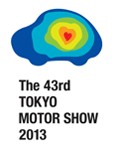The 41st Tokyo Motor Show 2009 Closes
- Leading-edge Environmentally Friendly Models, Technology Draw Attention -
- JNL-2009-46
- November 4, 2009
The 41st Tokyo Motor Show 2009 (Organizer: Japan Automobile Manufacturers Association, Inc.; Chairman: Satoshi Aoki), which ran for 13 days from October 23 (Friday) to November 4 (Wednesday) at Makuhari Messe International Convention Complex, Chiba City, closed today at 6pm.
This year's Tokyo Motor Show, with the theme "Fun Driving for Us, Eco Driving for Earth", sought to create as many new automobile and motorcycle enthusiasts as possible by allowing visitors to experience for themselves the dreams and fun that cars can bring us as we continue to seek ways to co-exist with the environment.
In particular, nearly 50 percent (19 out of 41) of this year's world premieres, on display for the first time anywhere, consisted of electric vehicles, hybrid vehicles, plug-in hybrid vehicles, fuel cell electric vehicles, and other environmentally-friendly vehicles. Through the exhibition of these various cutting-edge models and technologies, Japanese automobile manufacturers were able to prove themselves top-level competitors in the fields of environmentally-friendly vehicles and eco-technology.
This year's special events drew countless numbers of visitors. Among others, the Tokyo Motor Show's first test drive program for the latest passenger cars, including some next-generation models, and the newest motorcycles provided another opportunity to experience the "the dreams, fun and splendor of the automobile".
This year's Show lasted for four fewer days than the previous show, held in 2007, with exhibits distributed among the passenger cars, motorcycles, and parts/machinery sections. This, along with a reduction in the number of exhibits from foreign passenger car manufacturers to three brands, led to a total of 614,400 visitors for this year's Show, 43.1 percent, compared with the 2007 Show's 1,425,800 visitors.
The next Tokyo Motor Show
While this year's Tokyo Motor Show was reduced in scale from the previous one, it nonetheless welcomed many visitors from both Japan and overseas. The theme for this year, "Fun Driving for Us, Eco Driving for the Earth", also appealed to visitors.
In light of the results for this year's Show, future Tokyo Motor Shows will continue to aim to create new automobile and motorcycle enthusiasts, while responding to economic and market trends and the environmental changes affecting our automobile society.
The outline for the next Show is scheduled to be released in spring of 2010.
Supplementary information: results for this year's special events
This year's Show included a number of new attractions designed to create new automobile and motorcycle enthusiasts by showing visitors the "the dreams, fun and splendor of the automobile".
1. Passenger car test-drive program
Nearly 3,000 visitors test-drove 30 new models from 6 domestic manufacturers, including electric and fuel cell vehicles.
2. Motorcycle test ride program
Nearly 1,250 visitors test-rode 25 new models, both large and small, from 3 domestic and 3 foreign manufacturers.
3. Car of the Year Japan Special Exhibition for 30th Anniversary
With cooperation from the Car of the Year Japan Executive Committee, a showcase was held of 40 representative vehicles from past and present.
4. Tour of the Tokyo Motor Show Guided by the Automotive Journalist Association of Japan (AJAJ)
In this unique attraction, members of the Automotive Journalists Association of Japan (AJAJ), each of them active automotive journalists, conducted tours for general visitors of the various sights around the exhibition. Nearly 450 visitors took part.
5. Crafting Experience for Parents and Children
With cooperation from the Confederation of Japan Automobile Workers' Unions (JAW), a hands-on "Crafting Experience for Parents and Children" corner was set up to provide a space for the next generation to experience "the dreams, fun and splendor of the automobile". Nearly 1,600 visitors took part in this family-friendly attraction, where children could make papercraft cars, motor-driven models, and other craft projects.
###

